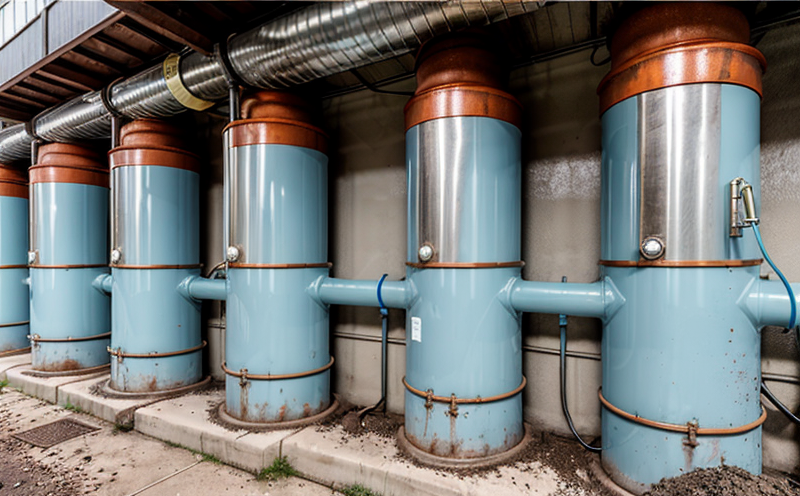ASTM D512 Chloride Ion Test in Water Systems
The ASTM D512 chloride ion test is a critical procedure used to measure the concentration of chloride ions present in water systems. This test plays a pivotal role in ensuring the quality and safety of potable water, industrial processes, and wastewater treatment facilities. Chloride ions can have significant impacts on various aspects of water quality, including taste, corrosiveness, and potential for scaling or deposit formation.
Chloride ion content is particularly important because high levels can lead to corrosion in metal components within pipelines and storage tanks, which can compromise the integrity and longevity of these systems. Additionally, chloride ions are a key factor in the process of galvanic corrosion, where they facilitate the electrolytic transfer between dissimilar metals.
The ASTM D512 method involves titration using silver nitrate to precipitate chloride ions as silver chloride. The endpoint is determined by the appearance of a permanent turbidity due to the formation of this salt. This procedure provides quantitative results that are essential for monitoring water quality and ensuring compliance with local, national, and international standards.
The test is widely used in sectors such as drinking water supply, wastewater treatment, and industrial process water management. Compliance officers, R&D engineers, and quality managers rely on accurate chloride ion testing to maintain the integrity of their systems and ensure regulatory adherence. The ASTM D512 method is recognized internationally and is often a prerequisite for ensuring potable water meets World Health Organization (WHO) standards.
For industrial applications, controlling chloride levels can prevent costly repairs due to corrosion. In wastewater treatment facilities, managing chloride ion concentrations helps in optimizing the efficiency of treatment processes and minimizing environmental impact. The precision and reliability of ASTM D512 are crucial for these applications, ensuring that water systems remain safe and operational.
The test is not only about measuring chloride ions; it also serves as a broader indicator of water quality. High chloride levels can suggest potential issues related to saltwater intrusion or industrial discharge, both of which require immediate attention. By using this method, water utilities and industries can proactively address these concerns before they escalate into larger problems.
Understanding the role of ASTM D512 in water systems is essential for stakeholders involved in maintaining quality control. The test results help in making informed decisions about maintenance schedules, material selection, and operational adjustments to ensure that water systems function efficiently and safely.
Applied Standards
The ASTM D512 chloride ion test aligns with several international standards aimed at ensuring the quality of water. The primary standard for this method is ASTM D512, which provides detailed procedures for determining the concentration of chloride ions in water by titration.
- ASTM D512: This standard specifies the procedure for determining chloride ion content in water using a silver nitrate titration. It outlines the apparatus required, including a burette and a sample container, as well as the reagents needed such as silver nitrate solution.
- ISO 3696:1987: While not specifically targeting chloride ion testing, this international standard provides general guidelines for water quality analysis that can be applied in conjunction with ASTM D512.
- EN ISO 10401: This European standard sets out requirements for water quality sampling and preservation methods, which are integral to ensuring accurate test results when using ASTM D512.
The use of these standards ensures that the chloride ion testing process is consistent and reliable across different regions and industries. Compliance with these guidelines helps in maintaining high-quality water systems and meeting regulatory requirements.
Eurolab Advantages
Eurolab offers unparalleled expertise and precision in conducting ASTM D512 chloride ion tests for water systems. Our team of experienced professionals ensures that each test is carried out according to the stringent specifications laid down by ASTM standards.
- Accurate Results: Eurolab employs state-of-the-art instrumentation and adheres strictly to the procedures outlined in ASTM D512, ensuring accurate and reliable chloride ion concentration measurements.
- Comprehensive Reporting: We provide detailed reports that include all relevant data points from the test, along with interpretations and recommendations for action based on our findings. This ensures clients have a clear understanding of their water quality status.
- Regulatory Compliance: Eurolab's tests are conducted in compliance with international standards, helping clients meet regulatory requirements and ensure they remain compliant with local regulations.
- Expertise: Our technical team has extensive experience in water testing and can provide valuable insights into potential issues and solutions for maintaining optimal water quality.
The combination of our advanced facilities, experienced staff, and adherence to international standards makes Eurolab the preferred choice for chloride ion testing in water systems. We are committed to delivering high-quality results that contribute to the long-term sustainability and safety of water resources.





